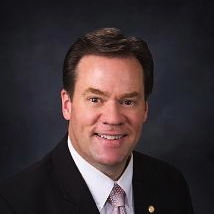The Senate Education Committee put its stamp — albeit a faint stamp — on the K-12 budget on Wednesday.
The committee opened the morning with a public hearing on two contentious pieces of the budget, pay for performance and technology pilot projects. Less than two hours later, Education Committee Chairman John Goedde got a chance to carry a bill on the Senate floor addressing these policy matters.

The wording was familiar, as Goedde, R-Coeur d’Alene, conceded during debate. His Senate Bill 1199 bore more than a passing resemblance to House Bill 323, the K-12 budget that Goedde had helped defeat on the Senate floor, just seven days earlier.
One week ago, the state Senate rejected one $1.308 billion public schools budget. The Legislature is poised to pass a second, virtually identical $1.308 billion public schools budget within the next 24 hours. But this has never been a debate about dollars. It has always been a debate about nuances and process.
The nuances
SB 1199, the “policy” end of the new K-12 budget equation, tightens reporting requirements to the state, and contains a couple of other wrinkles:
- Authors added three words into the pay for performance ground rules: “establishment of goals.” The failed school budget plan called for grading pay for performance against “objective measures of growth in student achievement;” SB 1199 also requires setting goals for schools or teachers on the front end.
- Technology pilot grants must go to multiple school districts — not a single district — and programs will run no longer than two years.
By no means was this an extensive rewrite. And it left one Senate Education member grumbling.

“The Senate got rolled,” Emmett Republican Steven Thayn told the Associated Press.
But the Senate was in a weakened negotiating position. Senators were fighting budget language that received 15-5 support in the budget-writing Joint Finance-Appropriations Committee, a 52-16 vote on the House floor, and enjoyed backing from Superintendent of Public Instruction Tom Luna, the Idaho School Boards Association, the Idaho Association of School Administrators and the Idaho Education Association.
The process
The K-12 budget got caught in the middle of a long-simmering turf battle in the Statehouse, pitting JFAC against policymaking committees such as Senate Education.
As it turned out, the battle centered on 2 percent of a $1.3 billion proposal: $21 million for pay for performance and $3 million for technology pilot programs. Critics saw these line items — “intent language,” in the legislative vernacular — overstepped JFAC’s authority and usurped Senate Education.
The Senate voted down the budget by a 17-18 margin, with seven of the no votes coming from Senate Education Republicans.
The surprise vote brought the legislative process to a crawl — but the process moved quickly Tuesday and Wednesday.
SB 1199 was swiftly introduced Tuesday, after a perfunctory committee hearing.
And the Senate and House education committees got their chance to take public testimony at a quickly arranged and lightly attended hearing Wednesday morning. The testimony came largely from the education stakeholders that frequent many education committee hearings — Luna, ISBA, IASA and IEA.
Sen. Jim Patrick, R-Twin Falls, said he was more comfortable with the budget after holding a public hearing, and hearing unanimous support for SB 1199. That was indeed the case — but was no surprise, considering the widespread support for the original budget bill.

Sen. Russell Fulcher, R-Meridian, said he was comforted by the rewording, and by the process. “It’s not exactly what I would have scripted. … But it does reflect some ongoing objectives that we have been trying to get to for some time.”
Ultimately, the committee got its hearing, a key step in the dance toward adjournment.
What isn’t clear, and may not become clear until the 2014 session at the earliest, is whether this late-session Senate showdown changes the way things are done and dollars are spent in education — or anywhere else in state government.
